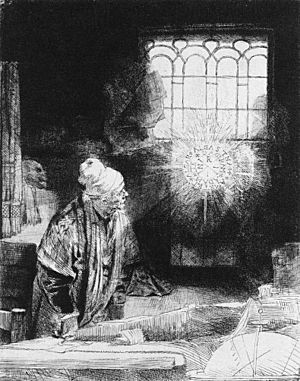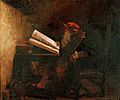Faust facts for kids
Faust (or Faustus) is a famous character from German legends. His name comes from a Latin word meaning "lucky." The legend tells the story of a man named Faust. He wants to gain a lot of knowledge and power.
Faust meets the Devil, often called Mephistopheles. The Devil offers Faust anything he desires. This includes all the knowledge, pleasure, and power in the world. In return, Faust must give the Devil his soul after a certain time. Faust agrees to this deal. He enjoys a wonderful life filled with amazing experiences. However, when the time is up, Faust must go to Hell.
This story became very famous across Europe. Many writers from different countries have written their own versions of the Faust tale. These include Christopher Marlowe, Goethe, Mikhail Bulgakov, and Thomas Mann. Many composers also created music about Faust, such as Hector Berlioz, Franz Liszt, Charles Gounod, and Ferrucio Busoni.
The word "Faustian" is an adjective. It describes someone who wants something so badly that they make a bad deal. This deal often leads them into serious trouble later on.
The Original Faust Story
In the first versions of the Faust story, Faust always faced a terrible end. He was "damned," meaning he would go to Hell forever. This happened because he chose human knowledge over God's knowledge. People at that time thought this was a very bad choice.
These early stories were told in ballads, dramas, and puppet-plays. Sometimes, Faust was even shown as a silly character in funny puppet shows.
Faust in Famous Plays
The story became very popular in England. This was after Christopher Marlowe wrote his play, The Tragical History of Doctor Faustus. In Marlowe's play, Faust is a scholar who makes a deal with the Devil.
Centuries later, Goethe wrote his own famous version called Faust. In Goethe's story, Faust is a highly educated man. He wants more than just basic things like "meat and drink." He seeks a deeper understanding of life and the universe. Goethe's version explores more complex ideas about human desires and redemption.
Images for kids
-
A manuscript of Marlowe's Faustus at the Huntington Library, San Marino, California.
-
An illustration by Harry Clarke for Goethe's Faust.
-
Feodor Chaliapin as Méphistophélès, 1915.
See also
 In Spanish: Fausto para niños
In Spanish: Fausto para niños
 | Jackie Robinson |
 | Jack Johnson |
 | Althea Gibson |
 | Arthur Ashe |
 | Muhammad Ali |







